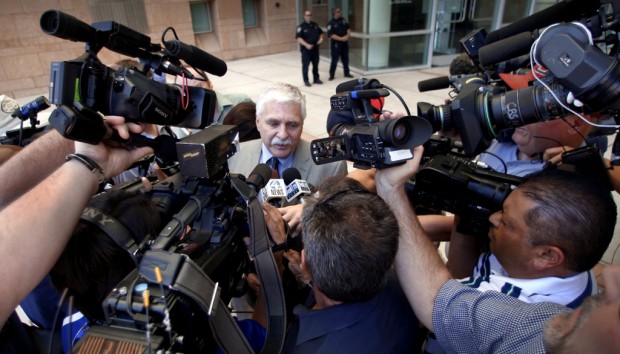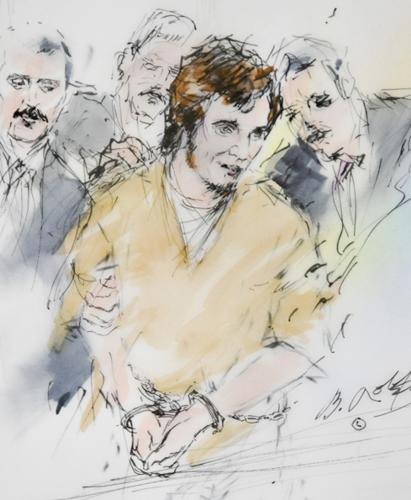Jared Lee Loughner lifted his head from the defense table and interrupted a hearing Wednesday about his competency to stand trial for the Jan. 8 mass shootings.
"Thank you for the freak show," he said, his voice rising. "She died in front of me. You're treasonous!" he continued before deputy U.S. marshals hustled him out a side door.
Loughner, 22, was no longer in the federal courtroom about a half-hour later when U.S. District Judge Larry A. Burns made a ruling that the packed courtroom had come to expect: He is incompetent to stand trial.
The ruling set off what could become a cycle of treatments for Loughner, followed by evaluations and competency hearings, as federal-prison employees work to restore him to competency. He will be sent back to the U.S. Medical Center for Federal Prisoners in Springfield, Mo. this week, said Wallace Kleindienst, the lead federal prosecutor in the case.
Burns' ruling reflected the opinion of the psychologist and psychiatrist who evaluated Loughner - Loughner is so delusional, irrational and psychotic that he cannot understand the court proceedings or help his lawyers.
Kleindienst and Loughner's lead attorney, Judy Clarke, accepted the judge's ruling. One of the evaluators' findings is that Loughner views his own attorneys as part of a conspiracy against him, Burns said.
"It would be difficult, if not impossible, for any lawyer to try to reason with the defendant," Burns said, citing written reports from the two evaluators and 18 hours of interview videotapes the judge viewed.
"The defendant was generally unable to provide rational and coherent thoughts," Burns said. "At times he answered simple questions with answers that were lengthy and nonsensical."
Both psychologist Christina Pietz and psychiatrist Dr. Matthew Carroll analyzed whether Loughner is "malingering," or faking his mental illness, Burns said. They concluded he is not.
As Burns described Loughner's condition, his parents began crying in their seats three rows back from the defense table. Both Pietz and Carroll said Loughner has schizophrenia, the first confirmation of a diagnosis many had speculated about since Jan. 8. Loughner has been coming down with the mental illness for two or three years, Burns said, citing Pietz's report.
Loughner is charged with shooting 19 people, killing six of them, at a Jan. 8 public event held by U.S. Rep. Gabrielle Giffords, who was wounded by a shot through the head. He has pleaded not guilty.
More than 100 people packed the courtroom, including dozens of victims or their family members, dozens of reporters, and crowds of attorneys and deputy marshals. An overflow room was outfitted with a video feed of the hearing.
Some attendees heard the first words of Loughner's outburst as "Thank you for the free pill" or "free kill," rather than "freak show."
After Loughner's outburst, Burns ordered a 10-minute recess, then had deputy marshals bring him back into the courtroom. He offered Loughner the option of staying in the courtroom, if he could remain calm, or watching proceedings on a TV in a side room.
"I want to watch the TV screen," he said. In the audience, attorney Laura Udall grasped the hand of Loughner's father, Randy, who was hunched over in apparent sorrow.
Loughner had a thick shock of brown hair and sideburns, contrasting starkly with the shaven head he had the day of the shootings.
Burns set a deadline of Aug. 31 for the two evaluators to submit new reports on Loughner's competency. He said he will hold a new hearing Sept. 21 if there is reason to think Loughner has become competent. If he is found competent, the criminal case will proceed again toward trial.
Medical personnel in Springfield will attempt to give him medication to treat his illness, Kleindienst said. If he refuses, that could lead to a new court hearing about whether Loughner can be forced to take medication.
Efforts to restore a defendant's competency generally take place in a setting more like a psychiatric hospital than a prison, said Joel Dvoskin, an assistant professor of psychiatry at the University of Arizona, who oversaw New York state's correctional mental-health system for 11 years. The defendants often receive psychotropic medication and individual psychotherapy. They may also have group therapy and even classes on the court system.
All of that leads to a re-evaluation that must take place within four months. While it may not be as painstaking as the first evaluation, it will be time-consuming and thorough, he said.
"Many people, the majority of people, become competent in a matter of months," Dvoskin said. "For some people, it takes much longer. For a few, they're never competent."
WHAT'S NEXT
In the next few days, Jared Lee Loughner will be sent back to the U.S. Medical Center for Federal Prisoners in Springfield, Mo. That's the same place where he was evaluated for five weeks in March and April. There, medical workers will try to restore him to competency. A new competency hearing is scheduled for Sept. 21 but could be waived if evaluators find his condition unimproved.
Contact reporter Tim Steller at 807-8427 or at tsteller@azstarnet.com





